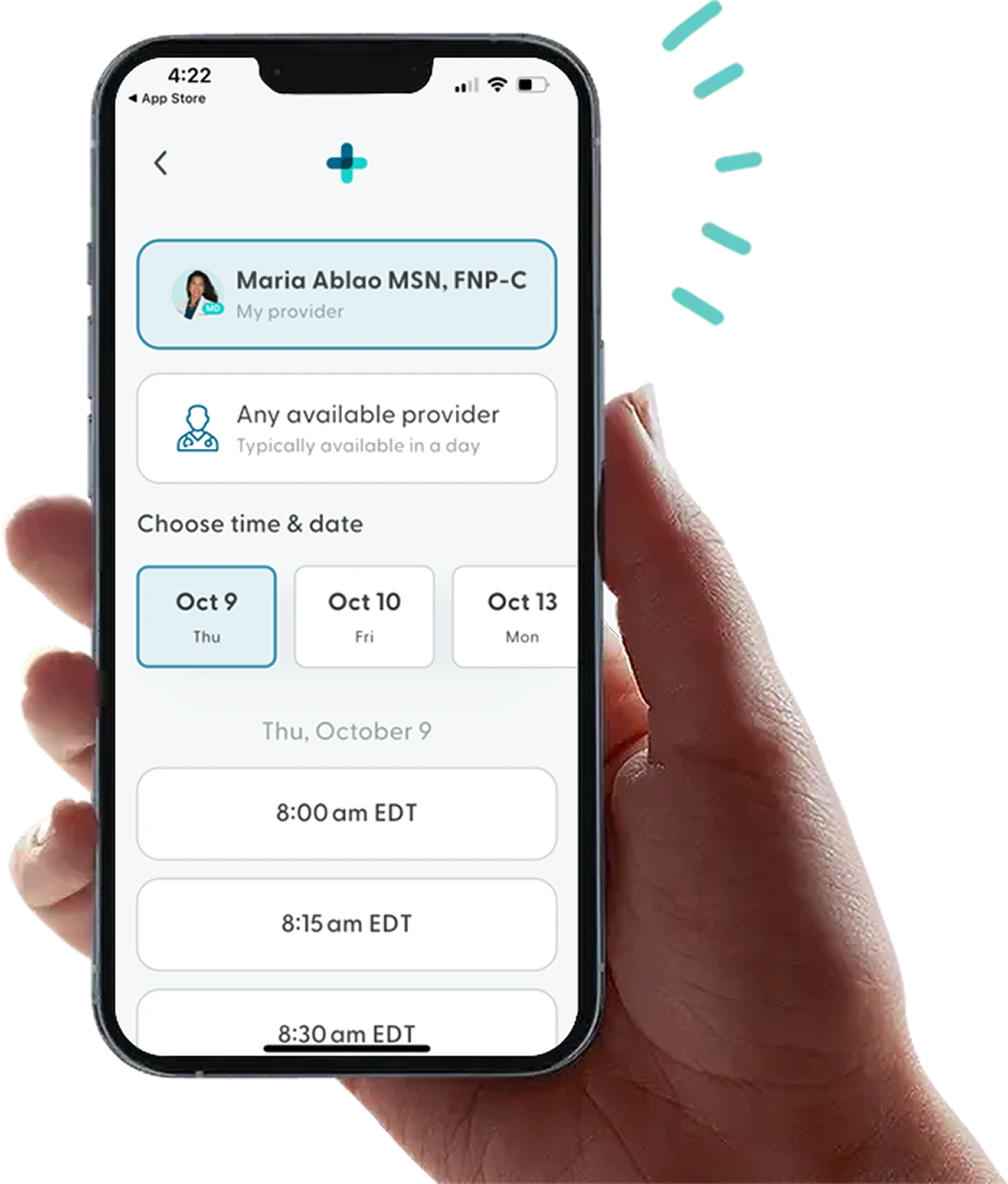Why Do I Want to Eat All the Time?
The persistent urge to eat — whether it’s a midnight snack or a desire for comfort food — is something most people will experience in their lives.
This urge is known as hedonic hunger and can be influenced by a number of different factors.
It’s also important to note that consistently giving in to this “hunger” can have detrimental effects on your overall well-being.
That’s why it’s important to understand the causes of constant cravings and to know which strategies you can implement to manage them.
In this article, we’ll take a closer look at why you have a desire to eat all the time, as well as what you can do to reduce these urges and lead a healthier life.
Get prescription weight loss medication online.
Find out if you're eligible for GLP-1s, and get started on your weight loss journey for as low as $75/month.


Factors that Influence Eating Patterns
Having a constant urge to eat can be frustrating, especially if you don’t understand the cause of it.
We’ll take a look at common factors that can lead to persistent cravings and disordered eating.
Biological factors
It's essential to consider the biological factors that play a significant role in regulating your appetite.
These factors include hormone imbalances, blood sugar fluctuations, and nutrient deficiencies.
Hormones
Two hormones — called ghrelin and leptin — are essential for appetite control.
Ghrelin is often referred to as the hunger hormone because it stimulates appetite. Its levels tend to rise before meals, signaling to the brain that it’s time to eat.
People who experience frequent food cravings may have higher levels of ghrelin that makes them feel hungry more often.
Leptin is known as the satiety hormone and it is produced by cells that send signals to your brain when you’ve had enough to eat.
Individuals with leptin resistance — where their bodies don’t respond properly to leptin signals — may constantly feel hungry, even after consuming enough calories.
Blood sugar levels
Your blood sugar levels can have a significant impact on your eating patterns.
When they drop, it can trigger feelings of hunger because the body needs to replenish its energy.
This usually happens when you consume a meal high in sugar or refined carbs that cause blood sugar to spike.
Nutrient deficiencies
If you crave specific foods, it may be an indication that you have a nutrient deficiency. Here are some general guidelines to determine this:
Iron deficiencies can cause a condition called anemia, which can lead to cravings for nonnutritive substances like ice and dirt — this condition is known as pica. You may also crave red meat.
Magnesium deficiencies may lead to chocolate cravings, as cocoa is a good source of this mineral.
Protein deficiencies might cause persistent cravings for foods like meat, fish, or beans that are rich in this nutrient.
It’s important to note that cravings alone aren’t suitable for diagnosing a nutrient deficiency.
If you suspect that you’re lacking specific vitamins and minerals, make an appointment with your doctor who will do a blood test to determine if you have a deficiency.
Key Point: Will Constantly Eating Lead to Weight Gain?
When you consistently consume more calories than your body needs for energy, they are stored as fat. Over time, this can lead to weight gain.
Frequent snacking and giving in to persistent cravings — especially for high-calorie, low-nutrient foods — can contribute to this imbalance and make you gain weight more rapidly.
Continuous eating may also disrupt the body's natural hunger and fullness cues, making it harder to know when you've had enough to eat.
To maintain a healthy weight, it's essential to follow balanced eating patterns, recognize genuine hunger cues, and manage constant cravings to prevent excessive calorie intake.
Physiological factors
There are a number of physiological factors that can play a role in cravings and eating patterns. Let’s take a closer look at these:
Emotional eating
Emotional eating occurs when individuals use food as a coping mechanism to deal with their feelings, whether these feelings are positive or negative. Common emotions that can contribute to this include:
Stress: High stress levels trigger the release of the hormone cortisol, which can increase appetite and cravings for sugary and fatty foods. Many people turn to comfort foods as a way to temporarily alleviate stress.
Boredom: Boredom can lead to mindless eating, where individuals tend to snack without really being hungry. This can contribute to a constant desire to eat throughout the day.
Sadness: When they’re feeling sad or lonely, people may turn to food for comfort. Foods high in sugar and fat can stimulate the brain's reward system and temporarily improve mood. This can lead to frequent cravings during periods of sadness.
Happiness: Even positive emotions can trigger the desire to eat. Celebratory meals and indulgent treats often accompany joyous occasions, creating a connection between happiness and food intake.
The brain’s reward system
The brain's reward system plays a crucial role in our desire for food, particularly items that are rich in sugar, fat, and salt.
This system involves the release of neurotransmitters like dopamine, which create feelings of pleasure and satisfaction when we eat enjoyable foods.
Here is a closer look at how it works:
Sugar, fat, and salt: Highly processed foods often contain a combination of sugar, fat, and salt that triggers a powerful reward response in the brain. This can lead to cravings for these foods, even when the body doesn't need more calories.
Craving reinforcement: Each time you consume these rewarding foods, your brain reinforces the craving, making it more challenging to stop eating them in the future.
Environmental factors
The environment we live in and the external cues we encounter can impact our desire to eat.
Food marketing, for example, can have a powerful effect on the types of foods we crave and consume due to clever advertising.
Many of these advertisements are visually and emotionally appealing, which can manipulate individuals and trigger cravings.
Sales promotions — such as “buy one, get one free” or “limited time offer” — can also influence your eating choices without you realizing it.
Social and cultural norms may also play an important role in your relationship with food.
This is largely due to peer pressure, where you may feel obligated to make the same dietary choices as the group around you.
Over time, eating certain foods under peer pressure can become a habit that you indulge in even when you’re alone or not feeling hungry.
Key Point: Why Do I Feel Tired When I Eat?
Feeling tired after eating — often called a “food coma” or post-meal fatigue — is a common occurrence.
It can be caused by a number of factors, such as blood sugar fluctuations, digestion, and overeating.
The type of food you choose to eat can also impact your energy levels. Highly processed, sugary, and high-fat foods can cause the body to crash, which may make you feel tired after your meal.
Can Eating All the Time Be Harmful?
Constantly eating can indeed be detrimental to your overall health and increase your risk of developing serious medical conditions.
Eating all the time increases the likelihood of weight gain. Rapidly gaining weight may put you at risk of developing obesity and diabetes while putting strain on your digestive system.
This strain can cause further discomfort and digestive problems, including disrupting your metabolism and indigestion.
Constantly eating also increases your risk of developing an eating disorder, especially if you lose control of your consumption or use food as a coping mechanism.
Some individuals may respond to consistently eating by attempting to restrict themselves from food, which can further contribute to disordered eating patterns.
If you suspect that you may be developing an eating disorder, it’s important to seek professional help as soon as possible to avoid future health complications
Ready to achieve your weight loss goals?
Shed pounds with GLP-1 medication prescribed online by licensed healthcare providers for as low as $75/month.


Strategies for Managing Constant Hunger and Cravings
Persistent food cravings can be challenging to overcome, but with the right strategies, you can regain control over your eating habits.
Eat more balanced meals
One of the strategies for managing cravings is to focus on consuming balanced, nutrient-dense meals that provide satiety and sustained energy.
This means including a wide variety of food groups, minerals, and nutrients in each meal to ensure you make the most out of it. For example:
Protein can help you feel fuller and more satisfied for longer, so include things like fish, poultry, tofu, and beans in your meals.
Fiber-rich foods — like fruits, vegetables, whole grains, and legumes — can bulk up your meal and slow digestion, which can help reduce cravings.
Healthy fats contribute to feelings of fullness and satisfaction. Good options to include in your meal are foods like avocados, nuts, seeds, and olive oil.
Stay hydrated
Proper hydration is essential for managing constant cravings because thirst can sometimes be misinterpreted as hunger.
That’s why it’s important to drink enough water throughout the day and ensure that you consume hydrating foods — like watermelon or cucumber — to help with your daily intake.
You can also try limiting caffeine and alcohol. These fluids can contribute to dehydration, which may increase your desire to eat.
Incorporate healthy snacks into your diet
Having more healthy snacks on hand can be a valuable tool for managing the constant desire to eat, especially between meals.
Nutritious snacks that won’t increase your risk of gaining weight include:
Fresh fruits
Vegetable sticks with hummus
Greek yogurt drizzled with honey
Small handfuls of nuts and seeds
Implement stress management techniques
Stress is a common trigger for persistent cravings, and it often leads to emotional and mindless eating.
That’s why implementing stress management techniques into your routine can help reduce your cravings. These techniques may include:
Meditation and deep breathing to promote self-awareness
Regular exercise that releases endorphins and improves mood
Exploring hobbies and activities to relax and unwind
Seeking professional support if stress becomes chronic
Ensuring that you get enough sleep to promote proper bodily functioning
Should You Seek Professional Support for Cravings?
While you can manage cravings by yourself, it’s recommended to seek help if they become frequent or so intense that they disrupt your daily life.
If cravings are linked to emotional eating or mental health issues — like stress, anxiety, or depression — therapy or counseling can provide you with coping strategies that don’t involve consuming food.
Certain medical conditions or nutrient deficiencies may also contribute to cravings and require guidance from healthcare professionals or registered dietitians.
Remember that seeking professional help is a proactive and often necessary step toward a healthier life and body.
Your doctor can help you determine the cause of your cravings and provide tailored advice to help you overcome them.
Where Can You Learn More About Eating Habits and Management Strategies?
If you’re concerned about your food cravings or want to know more about strategies you can implement to control them, LifeMD is here to help.
A team of medical professionals can assist you with information and provide guidance on healthy eating habits and managing cravings — all from the comfort of your home.
LifeMD also offers a Weight Management Program for those who are worried about cravings leading to weight gain.
Make an appointment today to learn more about how LifeMD can help regulate your eating habits.
More articles like this
Feel better with LifeMD.
Your doctor is online and ready to see you.
Join LifeMD for seamless, personalized care — combining expert medical guidance, convenient prescriptions, and 24/7 virtual access to urgent and primary care.

GLP-1
Zepbound® Wegovy® Saxenda®
This is it! Be part of the weight loss movement everyone’s talking about.
Get Started Now
 Medically reviewed and edited by
Medically reviewed and edited by 








